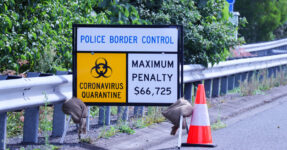Queensland Tightens the Noose on the Unvaccinated

Queensland Premier Anastacia Palaszczuk put another nail in the coffin of civil liberties democratic freedoms this week by refusing to allow unvaccinated people, including essential workers, to cross the border from New South Wales.
Hundreds of people were turned away in chaos at the border on Sunday when New South Wales went into a snap lockdown, amidst widespread confusion about the border declaration requirements.
No jab, no job
Over the past several months, we have seen several industries, such as aged care, health, quarantine and airport mandate vaccines for workers, yet the Queensland Government announcement sets a dangerous precedent, raising concerns that it could potentially pave the way for a blanket rule that will stop anyone who is not vaccinated from entering the state.
Border passes may soon be the norm
At this point, there is a great deal of uncertainty for people needing to cross the border to work or access medical care, or visit family members who may be sick or dying. Additional police resources have been deployed to ensure that all roads in and out of the state have checkpoints.
In recent weeks, Western Australia has also announced a tough new jab requirement for anyone travelling from NSW, requiring proof of at least one dose of the vaccination.
The significant difference for the rule in place for NSW and Queensland, is that there are tens of thousands of residents who live on the border and have, up until the pandemic, (and of course, the current lockdown) crossed the invisible line freely in the course of their daily lives – to take children to school, to work, to shop, or to access services.
With such harsh public health regulations being implemented at a state level, it’s looking highly likely that across Australia we could soon end up with ‘vaccination passports’ being required for everyone.
What’s worse, is that if the Federal Government doesn’t actually come up with a set of national guidelines or a national approach, then we’ll be left with a hotch potch system that changes from jurisdiction to jurisdiction.
So the pressure is mounting for the Morrison Government, and yet this is a decision that must not be rushed at any level of government.
It’s important to remember that these public health regulations are being made under ‘temporary’ Public Health Emergency Powers. As such, they are not tested by the rigorous processes of the full law making process.
While the laws may be repealed in time, there is always a risk they won’t be.
Mandating medical procedures
Mandating vaccinations takes away fundamental civil liberties and human rights and blatantly ignores principles of democracy, such as our right to privacy and personal choice when it comes to medical procedures.
Recently the Federal Cabinet began debating the implementation of a Covid passport/ certification for international travel. Several politicians were uneasy about such certification being issued domestically, even though the Prime Minister himself would like to see that happen. Now Queensland has made its own rules – which it can do.
Public Health is managed at a state level, the Federal Government has ‘oversight’ responsibilities for setting policies, but states and territories can do what they believe is necessary when it comes to combating the current public health emergency.
In France, new laws are currently before Parliament, requiring people to have a Covid pass to enter a range of venues such as restaurants, cafes, shops and cinemas, or risk a $16,000 fine and or prison time. Business owners who fail to check the status of patrons will face a 1 year prison sentence and a $72,000 AUD fine. The UK has also implemented a policy where Covid passes are required for large-scale events like music concerts and football.
Leaders around the world are making similar laws and regulations to encourage people to get vaccinated, in the belief that they are doing what is in the best interests of the public, but many have been criticised for rash fear-driven pandemic-decision making that doesn’t take into consideration the broader, and longer-term implications of mandated vaccinations.
The simple fact of the matter is that mandating vaccinations and introducing policies which ‘reward’ people who are vaccinated, not only infringes rights, it is discriminatory.
The right to informed consent, and to decline a medical procedure
The vaccine rollout is also underway in New Zealand.
However, several doctors in that country have urged New Zealanders to push back on the rollout for the reason that the vaccinations are new, and still in clinical trials. The doctors say it is also unethical to force someone to have a medical procedure against their wishes or under coercion.
Most doctors are trained under moral principles including that they do no harm, they understand that patients have the right to informed consent and that patients have a right to decline a medical treatment.
The Australian Medical Association (AMA) has adopted the World Medical Association’s declaration of Geneva, which states: “ I will not use my medical knowledge to violate human rights and civil liberties, even under threat.”
However, earlier this year, the The Medical Board of Australia and the Australian Health Practitioner Regulatory Agency (AHPRA) issued a joint directive warning members they risk disciplinary action for providing ‘false or deceptive’ advice or information that could undermine the national vaccination program.
Vaccination hesitancy
Some Australians are, and always will be, staunchly against vaccinations, but many others are just concerned that the vaccine has been rushed through truncated testing and approval processes, and this group would prefer to ‘wait and see’ what the potential side effects (if any) may be over the longer term. However, their right to choose is slowly being taken away, just as it might be in a communist nation.
What’s more, while the Australian Federal Government has given suppliers of Covid-19 vaccines indemnity against liability for rare side-effects, it has not put in place a full compensation scheme for all Australians.
Details of the pharmaceutical company indemnity are not completely clear, nor is what is defined as a ‘serious side-effect’ however, what the current situation amounts to is that if someone does believe they have been injured by the vaccine, they need to pursue any compensation through the legal system.
Australia doesn’t have a vaccination compensation scheme
If the vaccine was supplied by pharmaceutical companies protected by the Federal Government, then also under current policy, the government, rather than the drug company, would pay that compensation, should the person win their case. However, it’s no clear whether their are financial caps in place.
This puts a significant burden on any person needing to seek compensation to pursue action through the legal system which can be both time-consuming and costly, with absolutely no guarantee of success.
On the other hand, if a no-fault vaccine compensation system were in place, it would provide, when needed, easier access to compensation and provide a sense of certainty for Australians as the various state governments and the Federal Government continue the push for mandated vaccinations that we were always told would be ‘voluntary.’







